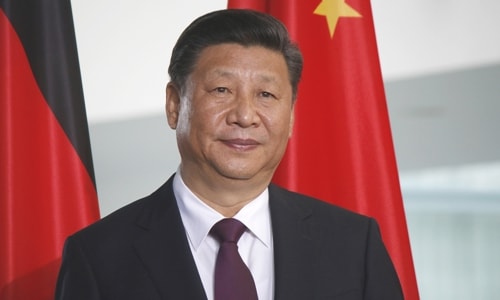President Xi Jinping calls for self-reliance, reducing dependence on foreign countries
Mr. Tap called on China to be self-reliant and reduce its dependence on foreign countries to avoid the risk of Chinese companies collapsing if they do not import goods from the US.
|
Chinese President Xi Jinping in China in July 2017. Photo:Reuters. |
China must treat accelerating the development of next-generation artificial intelligence as a strategic issue, Chinese President Xi Jinping told Communist Party officials this week.
Days ago, the US imposed restrictions on technology exports from the US to a Chinese semiconductor maker. The Trump administration's aggressive actions in the trade war have prompted Xi to intensify calls for China to be "self-reliant," according toWashington Post.
China must control artificial intelligence and ensure it is “kept firmly in our own hands,” he urged. As the trade war intensifies, Mr. Xi stressed that China needs to be able to stand on its own two feet and reduce its dependence on the United States, especially in technologies needed to boost its economy.
“Self-reliance is the starting point of China’s struggle,” Xi said last week in Guangdong during a four-day trip to southern China, where he inspected an electrical equipment factory and an e-commerce industrial park. Last month, during a tour of northern China, he also called on the country to “maintain the path of self-reliance amid rising protectionism” around the world.
The use of the term “self-reliance” recalls Mao Zedong’s frequent references to China’s economic decline in the 1960s. Now, Xi has used it as a rallying cry against President Trump’s tariff pressure, repeating that China needs to do everything on its own.
Qiao Mu, a China researcher in Washington, commented: "Mr. Xi is using 'self-reliance', inherited from Mao Zedong's political thought, to deal with economic problems caused by the trade war with the US."
To address the trade deficit with China, Trump unleashed a series of weapons. He imposed 25% tariffs on $50 billion and 10% tariffs on $200 billion of Chinese imports, and warned that the tariffs would rise to 25% in January if Beijing did not make concessions. He also threatened to impose tariffs on the remaining $267 billion of goods if Beijing tried to retaliate. China has few options to retaliate because it imports much less from the US than the US imports from China.
Beijing’s push for self-reliance came after the US in April banned US companies from working with Chinese telecoms company ZTE, accusing the company of selling products to Iran and North Korea and lying to US federal investigators. The ban nearly forced ZTE to shut down because it relied on US equipment supplies. The ban was lifted after Mr. Xi spoke with Mr. Trump.
The case has become a warning to Beijing that its core technologies are vulnerable to the US. This week, the US ordered its companies to restrict exports to Fujian Jinhua Integrated Circuit Co., a Chinese chipmaker accused of threatening US national security.
"The trade tensions with the US, and especially the near collapse of ZTE, have reinforced Chinese leaders' desire for self-reliance in technology," said Yanmei Xie, from economic research firm Gavekal Dragonomics.
However, Chinese spies have been accused of stealing key industrial technology from American companies, particularly in the aerospace industry. Earlier this week, the US Justice Department indicted 10 Chinese people who it said stole aircraft technology secrets from American companies.
China is celebrating the 40th anniversary of "reform and opening up" - the policy initiated by Deng Xiaoping that led to a huge change in China's economic power. During his tour of the south last week, Mr. Xi visited many places that were pilot zones for reform and opening up. He pledged to continue pushing the economy to a new stage.
Qiao said Xi is trying to consolidate power at a time of slowing economic growth. That trend will continue next week, when Xi will speak at the opening of a major import fair in Shanghai to promote investment in China. American business leaders such as Bill Gates and companies such as Honeywell will appear, but the Trump administration has declined to send officials.
Many experts are skeptical of Mr. Xi's economic vision and pledge to continue reform and opening up, seeing his continued focus on promoting state-owned enterprises.
“There is a major structural shift in the US-China relationship,” said China expert Bill Bishop, who doubts the two leaders will be able to achieve a breakthrough when they meet next month. “Even if Trump and Xi can reach a compromise at the G20, it will be a time-wasting exercise rather than a return to normalcy.”


